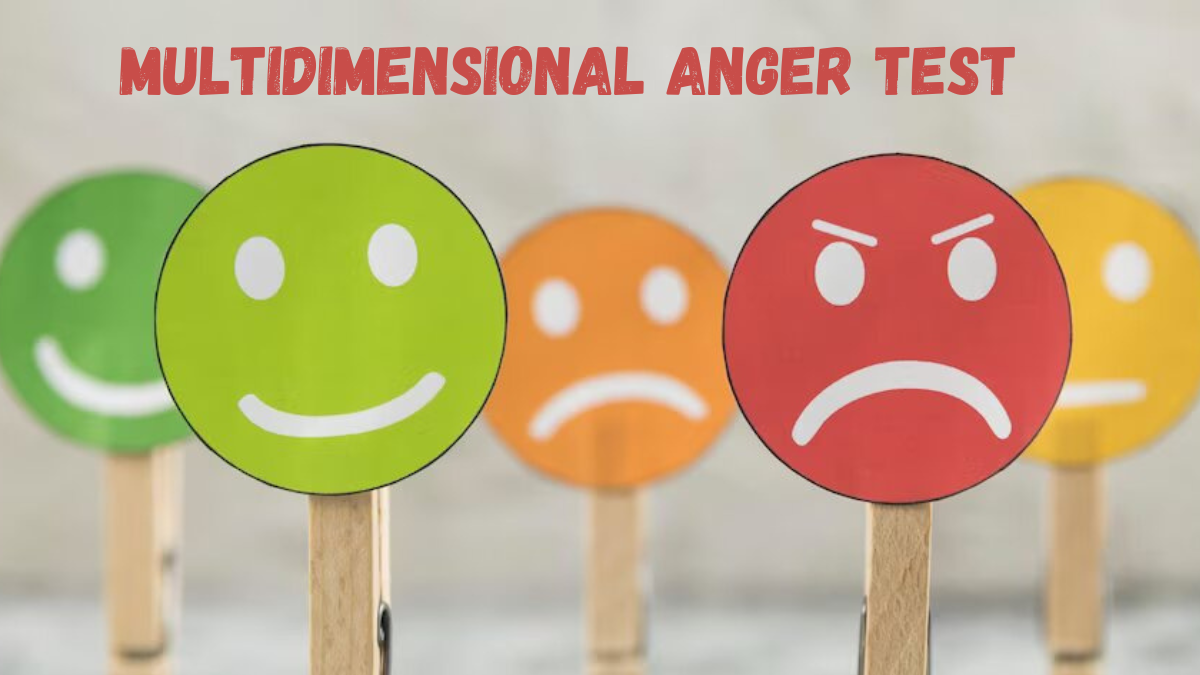Unveiling the Depths of Emotion: Exploring the Multidimensional Anger Test
Anger is a common emotion that may have a major effect on our day-to-day functioning in the modern world. While experiencing and expressing anger is a common human emotion, understanding how to manage your anger is essential to growth and maintaining healthy relationships. The multidimensional anger management inventory might be a useful tool for this.
What is the Multidimensional Anger Test?
The multidimensional anger test is a psychological assessment that uses several different criteria to determine an individual’s level of anger. It delves into not just the intensity of anger but also its root causes, such as individual differences, behavioral patterns, and the surrounding environment.
Why is Anger Assessment Important?
Identifying Triggers
Understanding what sets you off is an important part of any rage evaluation. Is it aggravation, stress, or certain individuals or circumstances? Understanding these causes is the first step in controlling one’s anger.
Gauge the Intensity
Not all rage indeed is the same. A person’s reaction to a given situation might range from moderate annoyance to full-blown anger. Taking stock of how furiously you’re fuming will help you decide if your rage warrants worry.
The Components of the Multidimensional Anger Test
The multidimensional anger test comprises several components, each shedding light on different aspects of anger:
Trait Anger
Anger levels are measured using a trait anger scale. Do you find yourself more easily annoyed than other people in typical situations? You may learn more about your inclination toward rage with this feature.
State Anger
The level of anger you feel at any given time is a reflection of your state of rage. It assesses if you tend to get angry more often under particular conditions.
Expression of Anger
The article discusses the several ways one might show rage. What do you do when you become irritated? Do you stuff your anger down or act it out? If you’re having trouble keeping your anger under control, learning how you typically express it may help.
Taking the Multidimensional Anger Test
Self-Assessment
There are several self-administered multidimensional rage assessments available on the internet. You may learn a lot about your anger patterns from taking these quizzes.
Professional Guidance
Seeking the advice of a mental health expert can provide you with a deeper insight into your anger as well as tailored advice on how to control it.
Interpreting Your Anger Scores
After completing the multidimensional rage test, it is crucial to understand the results to conclude. It might be fascinating to learn what causes your low and high scores and to spot trends in your rage behavior.
Applications of the Multidimensional Anger Test
The multidimensional anger test has a wide range of applications:
Personal Growth
If you use the results of the exam as a tool for self-improvement, you may learn more about yourself and how you express anger.
Relationship Enhancement
Relationships benefit greatly from knowing one’s anger triggers and tendencies. As a result, it’s easier to talk things out and settle disputes.

Anger Management
It has been shown that this assessment is helpful in the recovery process for those who are struggling with anger management difficulties.
Benefits of Using the Test
The multidimensional anger test offers several benefits:
Self-Awareness: It’s the first step toward improvement since it raises awareness of the complexities of one’s anger.
Improved Communication: Conflicts may be reduced by better communication and an understanding of your anger triggers and expressive style.
Stress Reduction: Successful anger management leads to less stress, which benefits health in general.
Common Misconceptions About Anger
Suppression vs. Expression
The idea that bottling up negative emotions is preferable to letting them out is widespread. Neither extreme is desirable in practice. The secret is in healthy communication and control.
Anger as a Negative Emotion
Although anger has a bad reputation, it may be a very effective motivator for positive change if used properly.
Dealing with Anger Constructively
Learning to deal with anger constructively is essential:
Anger Journaling: Keeping a journal about your anger helps provide light on causes and recurrent episodes.
Mindfulness and Meditation: Mindfulness and meditation training can help you maintain your equilibrium and control your emotions, making angry outbursts less likely.
Seeking Professional Help: Seeking the advice of a mental health expert is essential for people with significant anger disorders.
The Role of Empathy in Anger Management
Anger management is greatly aided by the capacity for empathy. Knowing how other people are feeling allows you to respond to them with empathy and prevents confrontations from getting out of hand.
Coping Strategies for Anger
Healthy Communication: Mastering strong and polite rage expressions is essential for successful interaction.
Time-Outs: The best way to handle anger is to stop what you’re doing and give yourself some time to calm down.
Physical Activity: Anger and tension can be relieved by physical activity, such as running or yoga.
Anger and Its Impact on Health
Anger can have far-reaching effects on health:
Physical Health: Health problems including hypertension and heart disease have been related to long-term rage.
Mental Health: Stress and melancholy might result from rage that isn’t controlled. Anger management is crucial to emotional health.
Anger in Different Stages of Life
Anger manifests differently in various stages of life:
Anger in Adolescents: Anger is a frequent manifestation of adolescent frustration with the demands of autonomy.
Anger in Adulthood: Work-related stress, interpersonal conflicts, and other difficulties in adulthood can all contribute to feelings of rage.
Anger in the Elderly: Health problems, isolation, and irritation with restrictions can all contribute to senior anger.
Conclusion
Anger is a complicated emotion, and the multidimensional anger test can help you better understand and control it. Individuals may improve their relationship with anger by learning to recognize triggers, evaluate the severity of their feelings, and practice good coping mechanisms.
FAQs
Q: Is anger always a negative emotion?
Anger can be a healthy emotion when expressed and managed appropriately, but if excessive or uncontrolled it can become problematic.
Q: Can anger be beneficial in any way?
Anger can catalyze change when used constructively, motivating individuals to tackle issues and effect positive changes in their lives.
Q: What is the best way to express anger?
The healthy expression of anger involves assertive communication, where one expresses their feelings and needs without resorting to aggression or violence.
Q: Can the multidimensional anger test be taken online?
Online resources and assessments for the multidimensional anger test are available, but consulting a mental health professional is recommended for a more comprehensive analysis.
Q: How can I help a loved one who struggles with anger issues?
Open communication, professional help, understanding, and empathy are essential in supporting a loved one with anger issues.







